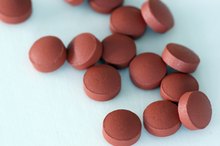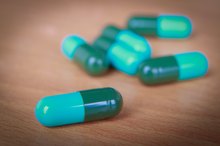L Arginine & Warfarin
If your doctor prescribes warfarin, you must be on guard against taking other medicines or dietary supplements that magnify its effects, because this drug can cause severe bleeding that may become life-threatening. The list of supplements that warfarin interacts with is long, including ginseng, alfalfa, devil’s claw, ginkgo biloba and horse chestnut 1. Discuss possible interactions with a health-care provider before combining warfarin with any supplement.
If you are experiencing serious medical symptoms, seek emergency treatment immediately.
Effects
It is OK to take warfarin with L-arginine, according to BJC Health, a nonprofit health-care organization that serves the St. Louis, southern Illinois and mid-Missouri areas. L-arginine, a semi-essential amino acid, works differently in your body than warfarin. The amino acid causes your blood vessels to relax, whereas warfarin works by preventing your blood from clotting.
Warfarin Use
Cayenne Pepper and Warfarin
Learn More
Warfarin, classified as an anticoagulant, is prescribed to keep blood clots in your blood vessels from getting larger. It’s also prescribed if you have suffered a heart attack, have certain types of irregular heartbeat or have a replacement or mechanical heart valve. It’s used as a preventive measure for venous thrombosis, which is the combination of swelling and blood clots in your veins, and blood clots in your lungs, called pulmonary embolism.
L-arginine Use
L-arginine changes into nitric oxide in your body. Nitric acid, in turn, causes vasodilation, or blood vessel relaxation. Preliminary scientific evidence suggests arginine may be helpful for medical conditions that improve with vasodilation, including clogged arteries, or atherosclerosis, as well as chest pain, coronary artery disease, heart failure, erectile dysfunction, peripheral vascular disease and headaches caused by blood vessel swelling, according to MayoClinic.com.cause:
- Preliminary scientific evidence suggests arginine may be helpful for medical conditions that improve with vasodilation
- including clogged arteries
- or atherosclerosis
- as well as chest pain
- coronary artery disease
- heart failure
- erectile dysfunction
- peripheral vascular disease
- headaches caused by blood vessel swelling
- according to MayoClinic.com
Expert Insight
Ibuprofen 800 Mg Vs. Diclofenac
Learn More
If you take warfarin, you need to get regular international normalized ratio, or INR, blood tests to ensure your dosage is safe range. You also need to provide your health-care providers with a complete list of your medications. That list must include over-the-counter medications, vitamins, herbs and other supplements 1. Also, be aware that supplements are not regulated by the U.S. Food and Drug Administration like medicines are, so you cannot be sure of the products' quality and contents, according to BJC Health.
- If you take warfarin, you need to get regular international normalized ratio, or INR, blood tests to ensure your dosage is safe range.
Related Articles
References
- “The Essential Food-Drug-Vitamin Interaction Guide”; George T. Grossberg and Barry Fox; 2007
- Coumadin (warfarin sodium) [package insert]. Princeton, New Jersey: Bristol-Myers Squibb, 20XX.
- Harter K, Levine M, Henderson SO. Anticoagulation drug therapy: a review. West J Emerg Med. 2015;16(1):11-7. DOI: 10.5811/westjem.2014.12.22933
- Patel S, Patel N. Warfarin. In: StatPearls [Internet]. Treasure Island (FL): StatPearls Publishing.
- Tideman PA, Tirimacco R, St John A, Roberts GW. How to manage warfarin therapy. Aust Prescr. 2015;38(2):44-8. DOI: 10.18773/austprescr.2015.016
Writer Bio
Linda Tarr Kent is a reporter and editor with more than 20 years experience at Gannett Company Inc., The McClatchy Company, Sound Publishing Inc., Mach Publishing, MomFit The Movement and other companies. Her area of expertise is health and fitness. She is a Bosu fitness and stand-up paddle surfing instructor. Kent holds a bachelor's degree in journalism from Washington State University.









